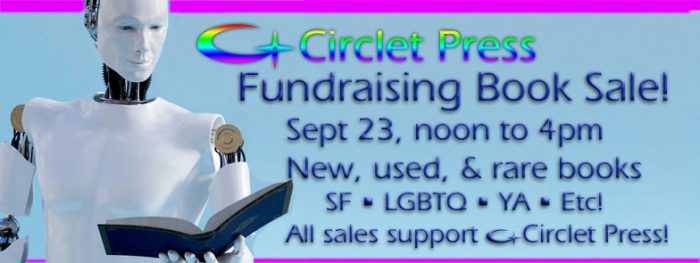
It’s hard to believe that 25 years have gone by since I founded Circlet Press by hand-stapling 100 copies of Telepaths Don’t Need Safewords on the floor of my Fenway studio apartment (the apartment was too small for a table). This week I’ll be opening my doors (at my much larger home in Cambridge) as part of our 25th anniversary celebration!
Two things are happening on Saturday September 23rd!
1. Massive book sale! 12 noon to 4pm
2. Party! Happy anniversary Circlet! 8pm to midnight
The massive book sale is just what it sounds like. We’ll be selling not only lots of Circlet books, some at bargain prices, some rare out of print for reasonable prices, we’ll also have tons of other books that we’ve accumulated in our 25 years as a publisher, including lots of science fiction, fantasy, romance, erotica, and YA. I get a lot of books in goody bags at conventions, publicists mail them here hoping for comment or review, and tons come every year when I serve on award juries, so there is a lot to choose from! Come on down and bring a shopping bag!
The party, on the other hand, is for all supporters, patrons, donors, and friends of the press! If you’re not a donor to the Kickstarter or the Patreon, go on and chip in now!
Kickstarter: https://kck.st/2xL0iEm
Patreon: https://www.patreon.com/circletpress
If you’re coming to the party, RSVP below so we’ll know how much food to get!
Schedule for #Outwrite2017 keynote speaker Cecilia Tan
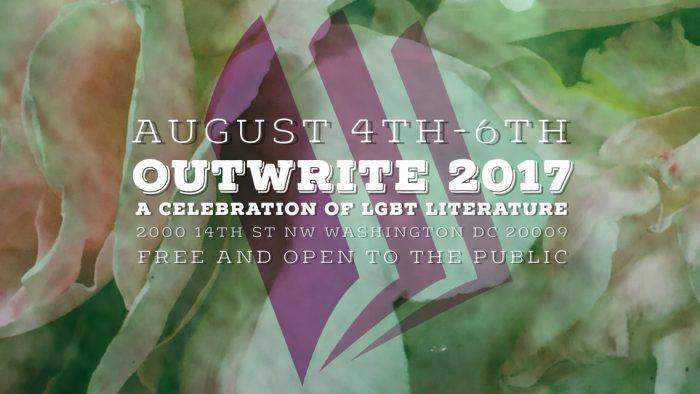
This weekend is the Outwrite queer lit fest in Washington, DC, and I’m honored to be this year’s keynote. Instead of doing a dull speech about how ancient and wise I am (hah) I’m doing a pile of events and panels:
FRIDAY NIGHT I’ll be one of the lineup of storytellers at Smut Slam Cabaret, where I’ll tell a brief adventure of how being an erotica writer almost sent me to the emergency room. Don’t try this at home, kids. No wait, home is exactly where you should try these things…
SATURDAY DAYTIME at the DC Center:
Free and open to the public!
I’ll be exhibiting and selling books from 10am to 1pm and then sporadically between my many shindigs:
1:00 PM THIS IS HOW WE DO IT
Panel on queer publishing. With me will be Lisa Moore (Redbone Press), Steve Berman (Lethe Press), Lori Perkins (Riverdale Ave Books), and moderated by S. Andrea Allen (BLF Press).
3:00 PM CIRCLET PRESS 25th ANNIVERSARY HISTORY AND BINGO GAME
I’ll tell you a tale of how the past 25 years of publishing adventure has gone, and to keep it interesting we’ll make it a bingo game! That way you can win books. Come have fun with me.
5:00 PM EROTICA READING
I’ll be reading with three other authors, Christian Baines, Dena Hankins, and Michael M. Jones.
6:00 PM KEYNOTE PANEL: THE POLITICAL AND THE EROTIC
With me will be some of the writers and editors on the front lines of the intersection of sex writing and politics, Sunny Moraine, Michael M. Jones, and Lori Perkins.
All events except the Smut Slam are at The DC Center For the LGBTQ Community, 2000 14th Street NW, Suite 105, Washington, DC 20009.
If you’re on Facebook you can see the complete lineup of events here: https://www.facebook.com/pg/outwritedc/events/
If you’re avoiding Facebook for political reasons, unfortunately I can’t find the full schedule of events anywhere, and given that many LGBTQ folks have very good reasons to avoid Facebook it’s a bit disappointing that the event’s main website doesn’t seem to have a schedule up (but maybe I’m just not looking in the right place): https://thedccenter.org/outwrite/
The #RWA17 Workshop on Creating Ensemble Casts

I’m at the RWA national conference in Orlando right now, where there’s always something more to think about, learn, or analyze about writing or romance publishing. In particular one writing craft panel I wanted to highlight was yesterday I attended a great panel workshop given by four New York Times bestselling authors: Lexi Blake, Cynthia Eden, Laura Kaye, and Rebecca Zanetti. The topic was on creating a large cast of characters to carry a series and the room was packed.
The discussion ranged over various details from the nuts and bolts of creating a series “bible” to keep all the details right from book to book (character eye color, favorite catch phrases, back stories, each character’s hidden secret or flaw, etc) to developing secondary characters into primary ones when “their turn for a book” comes.
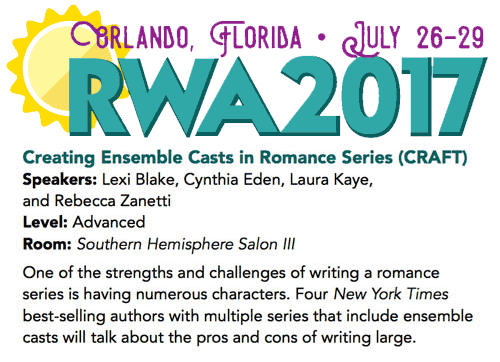
I didn’t transcribe the entire panel since I was trying to focus on absorbing things relevant to me, but two questions in particular I got down almost every word, and I’m posting to share it with everyone.
Laura Kaye acted as moderator, asking the leading questions for the panel and then finishing off giving her own answer.
First she asked the panelists to describe the pros and cons of working with large casts.
Cynthia Eden: We’ve all heard the expression that no man or woman is an island? Characters don’t exist in isolation. You’re never just writing about one individual. You are by circumstance always writing about a cast of characters. You give them an instant background with their family and friends. With my romantic suspense novels I like to use teams. I write FBI teams. You’re going to need a lead investigator, a profiler, an ME, etc. You’re going to need all these people. So that’s a major pro. And any cast leads to sequels. That’s the biggest pro because it has your reader eager to go on to the next book.
Lexi Blake: Pro of a large cast? It’s fun! I like to write a lot of dialogue and you get a lot of dialogue when you have a big ol’ cast of characters. The con is… I guess there isn’t one. Well, maybe it’s that you have to make each character unique. That can be a challenge. (But that’s fun, too.)
Rebecca Zanetti: A large cast is great to show characterization. You act differently with different people. I have one sister I tease like crazy and one that I can’t. You can show different facets of a character and that’s one I like a lot. Also the slow burn character, I love. That person who shows up in book one and they build up for a long time before they get their story. You can develop them over a series. The con is you sometimes get too many people on a page. Even if you’re on book 4 or 5 of a series, you hope new readers are picking them up. You don’t want to confuse that new reader with too many new characters all at once.
Lexi: Well, and as you write the books they get longer because you keep having to put everyone’s favorite characters in there. Then you have to do the backyard BBQ scene to get them all in!
Laura Kaye: I agree, on the backyard BBQ. The thing that is great about having all these characters is you have the built in relationships where it’s easy to have humor, and it’s easy to have stakes because there are many people who could be hurt or feel lied-to or betrayed. Lots of emotional hooks for your readers. Not just for your sequels where they buy into a beloved secondary character, but for the tertiary characters who can manage to hook interest and get pulled into the story. You can expand a series if it takes off and starts doing well. It gives you the flexibility to do spin-offs. The cons are that your POV characters can’t just absorb a tennis match of other people talking. They have to be engaged in the conversation. Then there’s the giant pronoun problem when you have, say, five military guys on your team planning a mission and you have to figure out the mechanics of writing that dialogue so it’s not monotonous to the reader. The other con is if you’re going with a traditional publisher and you have 5 main characters, but your publisher stops after three books. You can end up with disappointed readers on your hands.
What are some tips for developing such a large number of characters? What are some tips for distinguishing them?
Rebecca: One thing I like is nicknames, if he calls her honey or sweetcheeks makes a difference. Also their motivations. If you play a joke on one friend, they laugh, another one never forgives you. They’re different. There are the little tidbits you put in. I have one guy that likes grape energy drinks and if I don’t put that in readers will write and say does he not like those anymore? Also their wounds. What hurt this guy, what is he still afraid of?
Lexi: if you don’t know those characters, the reader won’t know them. I think you don’t have to know everything before you start, but you have to know what makes them laugh, what makes them cry. I’ve written a lot of small town romance. And getting to know the neighbors and walking through the town can pull you in. But even an office building can have a sense of place. Put your characters around a table and see who talks first. If you’re just putting traits in a notebook and there’s no real emotion behind them it’s going to show. I love using dialogue. Some speak, fast, some slow, and you need to be able to hear them in your head.
Cynthia: I like to work with opposites on a team. You’ll have one guy who’s the hothead and always jumps right in. Then I have a team member who likes to sit back and get all the info before jumping in. So she and the first guy are going to have a clash. My action-first character, if he’s angry, he’s not just going to sit still. He’ll be pacing and clenching his fists and all that. All this body language that this character is doing with reveal his personality. The one who is the analytical sort? She’s not going to just kick in a door. She’ll be trying to talk the person down. Those personality styles lead me into what they should do in each scene. You don’t want them doing something that isn’t their normal nature without a really, really good explanation. Be aware, though, I’ve had New York editors tell me that the way I talk isn’t real, people don’t say that. I’m Southern. Something that seems so normal to me was something they didn’t like. But I think bringing in realistic dialect is a great way to distinguish the characters.
Laura: Think of it as a shorthand for your character. I learned a lot about creating unique characters from reading JR Ward’s Black Dagger Brotherhood series. One is the blind king who wears the weird sunglasses. And one is the sarcastic one with the dragon tattoo who sucks on lollipops all the time. Then there’s the black-eyed, scarred one who is soulless and never speaks. I don’t even have to use their names: they’re immediately distinct. And when all twelve are in a room having a briefing session, you don’t have to use their names, because you know when so quickly from their distinguishing characteristics who’s who. Also, what are things that make the reader see them as endearing or real, that make the reader fall in love with that person? That grape energy drink or they’re a dog-lover or whatever. The more you can create those personal things the better, beyond scars and tattoos, beyond eye color and hair color. I have a lot of guys who swear but they can’t all say “Aw, hell.” Only one of them can say that and the other guys have to say something else.
As usual, the conference has been fantastic. If you are writing romance, or any kind of commercial fiction, I highly recommend attending one of these if you can afford it. In romance, I really feel I can’t afford *NOT* to be here!
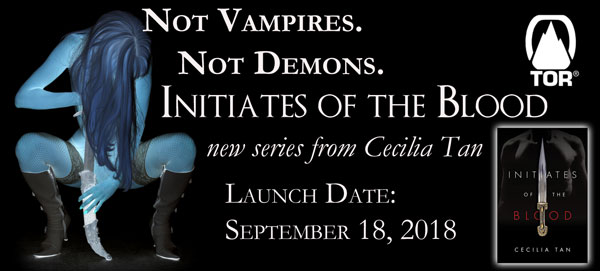
Coming Out as a Slytherin
Ars Technica published an article by me on Pride Day (yesterday, traditionally the last Sunday in June) entitled “Coming Out as a Slytherin.”
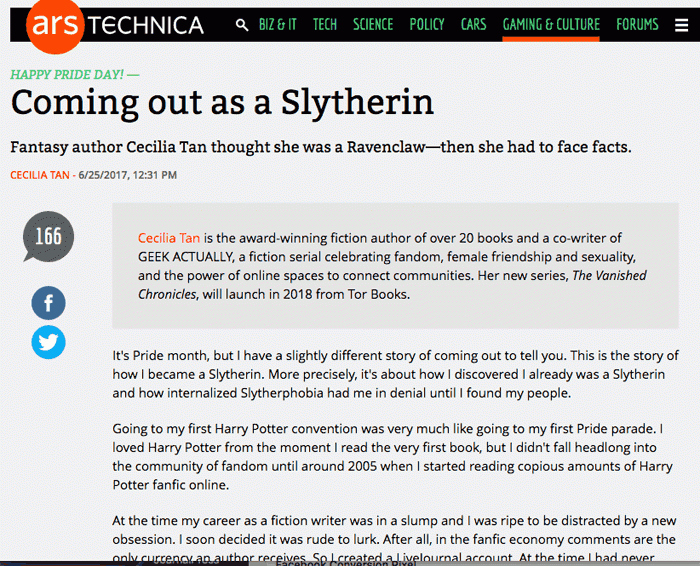
In the article I detail how there have been a series of “closets” whose doors I have had to kick down, from coming out as bisexual in the 1980s, to coming out as a pro who also wrote fanfic in the 2000s, to, eventually, realizing I had to come out as Slytherin, too.
In the article I talk about the pervasiveness of the anti-Slytherin bias in the books, which carries right through from Harry’s first hearing of the word through the epilogue:
“One of the magics of the Potter books for me was that as I read them, I was transported back to feeling like a kid again. … My journey as a fan… started from a childlike devouring of the books where I took Harry’s journey at face value. Harry hated Snape and Draco? I hated Snape and Draco. Harry thought all Slytherins are bad? I thought all Slytherins are bad. It’s a book for kids, right? A simplistic worldview is appropriate and comforting.”
“But the moment I leapt into fandom headlong was also when book six, Half-Blood Prince, came out. In that book, Harry keeps on thinking that Snape and Draco are villains. It’s also a book where many adult readers started realizing that Snape and Draco are victims. I went back and re-read the entire series through Snape and Draco’s eyes and what I saw was very different.”
“I guess you could say it was the Potter fandom equivalent of being woke. Continue reading →
Where to find Cecilia Tan at #TheBookCon – Diversity Panel & Autographing
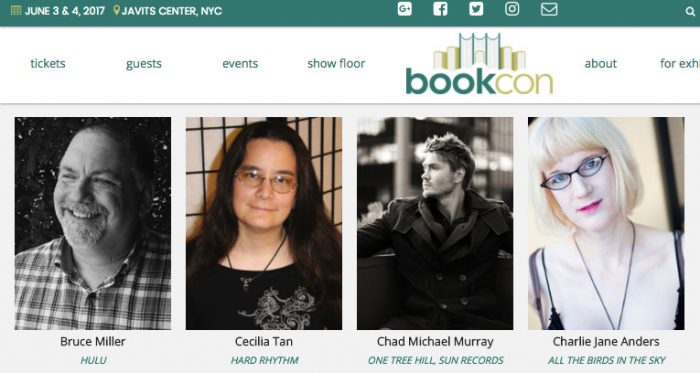
The annual book industry gathering known as BookExpo America is going on right now and then over the weekend it turns into booknerd paradise, an open-to-the-public extravaganza called The Book Con. See the full star-studded lineup of guests here: https://www.thebookcon.com/guests/2017-Guests/
(Holly Black! Bill Nye! Christina Lauren! Gabby Rivera! Heather Graham! Janet Mock! Majorie Liu! etc etc etc!)
I’ll be there doing the following:
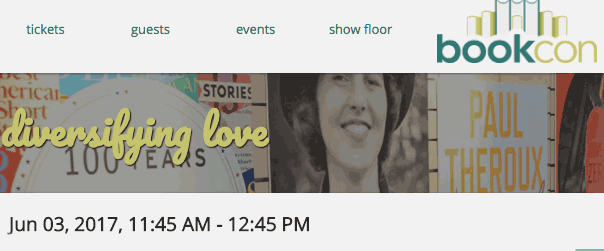
Diversifying Love: Panel Discussion
June 3, 11:45am to 12:45 am
Downtown Stage
Panel discussion moderated by Sarah MacLean (bestselling author and Washington Post columnist), joined by authors Nicole Blades, KM Jackson, Seth King, Tracey Livesay, Cecilia Tan, and Mara White and reader/USA Today Happy Ever After contributor Denny Bryce.
The official description: Multicultural romance is not new…but the majority of players in the proliferating and ever-popular Romance genre agree that stories of love need to feature “people of all colors, religions, abilities and sexual orientation” (thank you, #weneeddiversebooks, for trailblazing). As stories of race and prejudice blare and glare from national headlines, authors and readers of this popular genre agree about one powerful, life-changing/life-affirming message: Love Transcends. Romance has the power to open readers’ minds to stories that could imbue new understanding and acceptance in the ways we relate to one another. BookCon is pleased to host a frank discussion about the need for inclusive, representative Romance.
I *think* there will be giveaway copies of various of our books at the end of the panel? The description also says: “Discover all there is to love about a popular genre whose authors and readers are embracing a wide spectrum of experience, and we invite you to take away a book that will open your eyes to the multiverse of romantic possibility.” I’m just not sure which titles or how many of each will be on hand!
I KNOW there will be plenty of copies of HARD RHYTHM, my latest rock star romance, on hand at my other shindig, though, free autographing at the RWA Booth:
AUTOGRAPHING FREE BOOKS
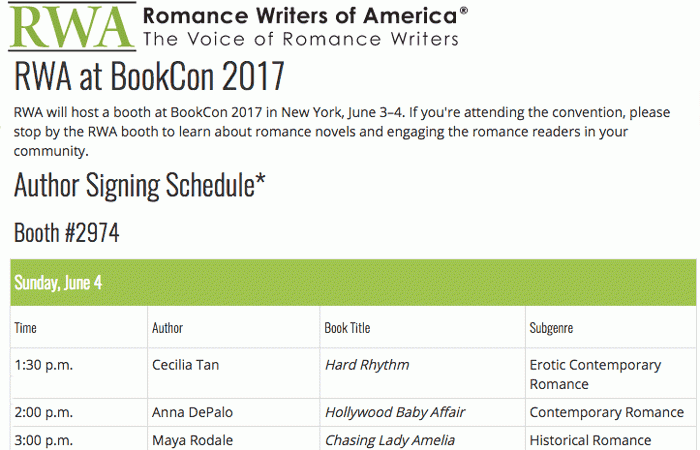
To see the complete schedule of who is signing in the RWA Booth on Saturday and Sunday, it’s posted here: https://www.rwa.org/page/rwaatbea.
The list includes Megan Frampton, Damon Suede, Joanne Rock, and many more writing in many genres from historical to YA to erotic contemporary. The signing at the RWA booth is FREE. Just line up and I’ll sign until either my time slot ends or we run out of books, whichever comes first! (Not all the autograph events at BookCon are free. Some you pay for the book. Not this one, though!)
I’ll be signing my latest one from Forever/Grand Central Publishing, HARD RHYTHM. It’s third in the Secrets of a Rock Star series, which can be read in any order. Each book involves a different member of the rock band known as The Rough. We’ve already had the lead singer (Taking the Lead) and the guitar player (Wild Licks), so now it’s drummer Chino Garcia’s turn.
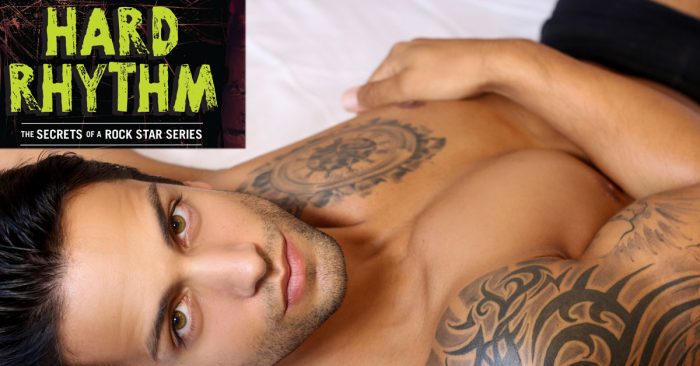

"Geek Actually" from @SerialBoxPub – "Sex in the City" for nerdgrrrls
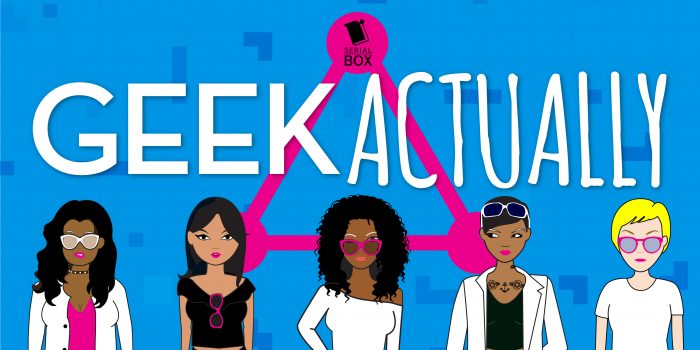
I’m so excited that a project I’ve been working on for almost a year is having its debut next week!
Geek Actually is a fiction serial I’ve co-written with Cathy Yardley, Melissa Blue, and Rachel Stuhler for Serial Box Publishing. The official tagline is:
Sex and the City for the modern geek girl. Follows the lives of five diverse, geeky women as they navigate work, love, life, and the internet.
It’ll be in text and in audio formats! The first episode (titled WTF) premieres June 7, 2017, with a new installment every Wednesday until the season finale on August 30. Episodes can be purchased individually at any time for $1.99, but Season Passes at Serial Box allow readers to pay for an entire serial upfront at a discount – $19.99 includes all 13 episodes in both text and audio (about $1.53 per episode).
You can read it via the Serial Box app on iOS or Android or subscribe through their website here. Or the individual episodes can be pre-ordered/purchased from:
Serial Box • Amazon • Barnes & Noble • Apple iTunes • and other usual places ebooks and audiobooks are sold!
Excerpts:
Before publication there’s a sneak peek of vignettes of the main characters here: https://bit.ly/get-GEEK-early
Smart Bitches Trashy Books published a preview excerpt: https://smartbitchestrashybooks.com/2017/04/geek-actually-cover-debut-excerpt/

Live at #RT17 – Mark Coker @Smashwords Ten Trends Shaping Authorship
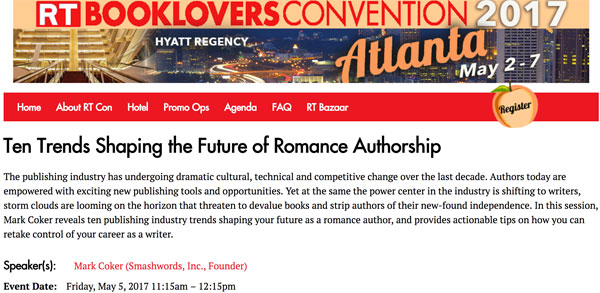
I’m at RT Booklovers this week, which is one of the largest reader/writer conferences out there. RT started life as “Romantic Times” but it now encompasses all commercial fiction genres including YA, mystery, women’s fiction, science fiction, and so on, but retains a strong romance focus. One of the major forces that has reshaped the book industry, and the romance genre in particular, of course, is ebook publishing and ebook SELF-publishing. A major figure in that revolution over the past ten years has been Mark Coker of Smashwords, one of the early self-publishing platforms and not only an online retail store but a distributor to the other retailers (Kobo, Apple, B&N, etc.)
Mark always has insightful things to say about the state of the ebook market, and later today he’ll be unveiling the annual Smashwords data survey, where they slice and dice the big data of what’s happening in sales across all retailers that they can see. But his earlier session today was “Ten Trends Shaping the Future of Romance Authorship.” With Mark’s permission I’ll now present you those ten trends as a listicle.
(Caveat: This is very close to verbatim what Mark said, but as a typist I can only capture about 60% to 70% of the true transcript, and any errors you may find in here are purely mine.)
Mark Coker: So much news happening every day, every month, it can be bewildering, and it’s easy to mistake ephemeral news for trends. Today I’m going to talk about firmly entrenched macro trends that are going to persist for a long time. These are what are driving your threats and opportunities in publishing forward. Some may be obvious, some may not. These may provoke some strong feelings. These are some important issues that should provoke greater discussion so please share this information widely: Continue reading →
The #RT17 BDSM panel wrapup and handouts
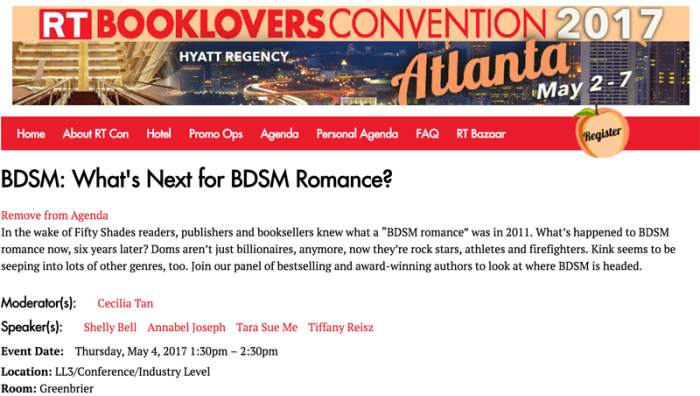
Thanks everyone who attended the panel at RT Booklovers in Atlanta on BDSM: What’s Next for BDSM Romance?
If you need the handout, you can grab the PDF from here: RT BDSM HANDOUT. It includes some specific sales numbers from the authors on the panel demonstrating the rise and fall of sales numbers.
I opened the panel by saying when we first started planning the panel it seemed like if we were all seeing sales drops like that, it was legitimate to ask whether the post-50-Shades “BDSM boom” was over. However, since compiling our numbers, I’ve been talking to many authors in other subgenres of romance and erotica, and to publishers as well, all of whom have seen very similar curves in rise/fall even when no BDSM is involved. So, it’s not just us.
Continue reading →
2016 Winners of the NLA Writing Awards
Did you all see that the winners of the NLA Writing Awards were released? These annual awards celebrate the best in BDSM-positive writing and publishing, in both fiction and nonfiction categories. As a member of the awards committee I’ve been involved with these awards for several years and this year had a bumper crop of books!
To quote from the press release that came from NLA: International:
National Leather Association: International, a leading organization for activists in the pansexual SM/leather community, announced the winners for excellence in literary works in SM/leather/fetish writing published in 2016. The judges received a great number of nominations this year and judging in most categories was quite difficult with such exemplary pieces of writing.
Winner of the Geoff Mains Non-Fiction Book Award is Peter Tupper and David Stein (ed.) for Our Lives, Our History (Perfectbound Press). Honorable mention in this category goes to David Wade for “Vanilla Breaks” (Xcite Books), Richard Levine for “Jolted Awake” (Alfred Press in cooperation with Lulu Enterprises, Inc.) and to Slavemaster and slave 7 “Beyond Obedience” (Createspace).
In the John Preston Short Fiction category, the winner is D.L. King for “Cupcakes and Steel” from the anthology For The Men and The Women Who Love Them (ed.) Rose Caraway (Stupid Fish Productions). Honorable mention for short story goes to Caraway Carter for “7 With 1 Blow” (Beaten Track Publishing) and Ferrett Steinmetz for “Rooms Formed Of Neurons and Sex” which appears in Uncanny Magazine.
The winner of the Pauline Reage Novel category winner is Angela Hamm for The Gambler’s Lady (Blushing Books). Honorable mention in this category goes to Amelia C. Gromley for Risk Aware (Riptide Publishing), Scott Alexander Hess for Skyscraper (Unzipped Books, an imprint of Lethe Press) and Jade A. Waters for The Assignment (Carina Press)
The winner of the Cynthia Slater Non-fiction Article Award is Erica Mena for “(K)ink #5 – Writing While Deviant” which appeared on January 26, 2016 on TheRumpus.net. Honorable Mention in this category goes to Jack Fritscher for “He Was A Sexual Outlaw: My Love Affair With Robert Mapplethorpe” which appeared March 9, 2016 in The Guardian.
There is no winner of the Samois Anthology Award as there were no submissions this year.
Congratulations to all the winners! Writers, publishers, the NLA starts taking nominations for judging in September and the deadline is typically December 31st annually for books published in the calendar year. Contact awards@nla-international.com for more details.
Art Within Context and Why "Universal" is Literary Code for "White/Mainstream"
I went down a bit of a rabbit hole yesterday when I dug into — don’t laugh — my archive of grad school poetry. Well, okay, laugh. I was so chipper and naive and the poems are so earnest and trying so hard. They’re better than my junior high poetry but only in certain light. Some of them are actually good. Or they would be if they had been able to live and breathe within a matrix of expectations on equal footing with the literary canon.
My whole Twitter epiphany was graciously collected by Charles A. Tan (no relation) on Storify:
The gist of the thread is this: my grad school poetry professor couldn’t see that there was a contradiction for those of us who weren’t white, straight males when told that we had to write “universal” themes in our poems that could be understood implicitly without having to be “explained”. In his view, if someone couldn’t understand your implicit message it was because it was a bad poem, and if you had to make it too explicit that was also a bad poem. By extension the messages that could be received most implicitly were “literary” ones. In other words, if it was about a white man’s alienation after an act of war (for example), the reader should “get” that even if war was never mentioned explicitly in the poem. The problem is that if the implicit message is something that is “universal” within a marginalized community–for example, internalized homophobia–those who have never experienced it won’t “get” it. And rather than admit that there are things outside their experience, the literary establishment instead brands those topics as marginal, and only lauds their appearance when they make themselves accessible to the literary mainstream.
Short version: “literary” is a worldview that centers academia, particularly white male upper middle class academia. At the time I just didn’t have the perspective to see that. “Literary” equals “laudable” in MFA programs. It’s a self-reinforcing system.
I quit writing poetry because for me to perform the same artistry would require my poems to exist in a context where the implicit things that didn’t have to be “explained” were things like internalized homophobia, questioning cultural identity, and code switching. And that context didn’t seem to exist. My poems were “meaningless” to the literary establishment, and I had plenty of things to write instead, in other contexts. (Come to think of it, founding the English language’s only erotic science fiction publishing house in 1992 was me creating my own context for my fiction.)
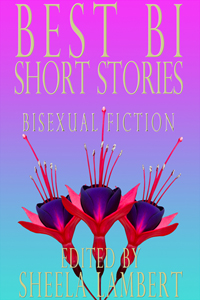 This introspection was all brought on by the fact that Sheela Lambert of the Bi Writers Association — the editor of Best Bisexual Short Stories (Circlet, Amazon) and the driving force behind the Bi Book Awards — is editing a book of “bisexual poetry.” (Call for submissions here.) I’m bisexual and I figured I would look and see if there was anything obviously “bisexual” about my poetry from back in the days when I wrote poetry. If. Ha. “If.”
This introspection was all brought on by the fact that Sheela Lambert of the Bi Writers Association — the editor of Best Bisexual Short Stories (Circlet, Amazon) and the driving force behind the Bi Book Awards — is editing a book of “bisexual poetry.” (Call for submissions here.) I’m bisexual and I figured I would look and see if there was anything obviously “bisexual” about my poetry from back in the days when I wrote poetry. If. Ha. “If.”
In fact, lo, I went back and saw that a ton of my angsty metaphor-laden poems from the early 1990s are now, in retrospect, quite obviously about internalized homophobia and/or about being caught between communities, even if not a single person in my poetry workshops (including me, sometimes) could articulate that. But I wonder if these poems will read “properly” if they were to be published in a book with a bisexual or queer context? I guess I will submit them and see.



